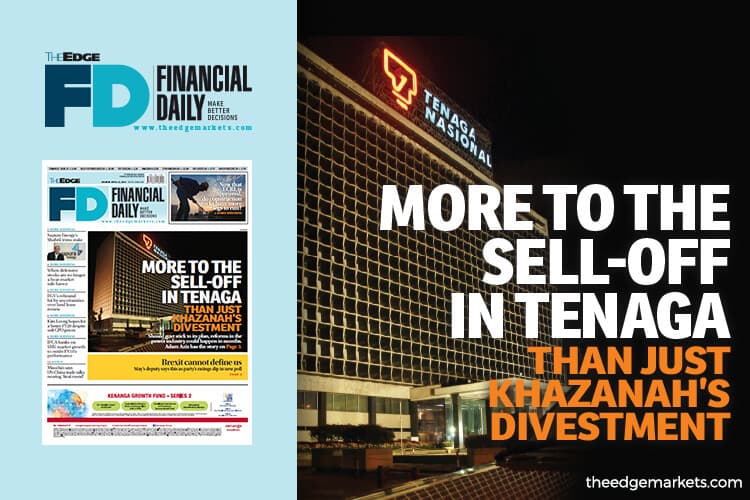
This article first appeared in The Edge Financial Daily on April 15, 2019
KUALA LUMPUR: Was the sell-off in Tenaga Nasional Bhd’s (TNB) shares last week overdone?
The heavyweight blue chip slid to a three-year low last Thursday after its largest shareholder Khazanah Nasional Bhd placed out 85 million shares in the company at below market price.
The 1.5% stake was sold at RM12.33 per share, or RM1.05 billion in total, which was at a 2% or 25 sen discount to the closing price of RM12.58 the day before. Khazanah still owns 27.27% of TNB after the placement.
Share placements at a discounted price are not rare, especially for such a high-value transaction. Still, it did not go down well with the market. TNB’s share price lost ground, and the blue chip sank below the placement price once the news broke.
The utility stock plunged 5.09% to its intraday low of RM11.94 last Thursday. The sharp fall dragged down the FBM KLCI to a more than two-year low that day.
Noting that a discount is normal for such a sizeable share placement, some analysts said the discounted price does not necessarily reflect the fair valuation of the company.
A local fund manager said the news might have given a good excuse to short-sell the utility stock, which may explain the temporary selldown.
Indeed, TNB’s share price rebounded to RM12.28, it was the third-biggest gainer, in terms of value, on Bursa Malaysia last Friday. Still, the share price is lower than Khazanah’s placement price.
All said, it is worth noting that TNB’s share price has been on the decline since October (the month when it released the third-quarter earnings), after it bounced back from the post-14th general election selldown across the board.
Khazanah’s rationale for the placement aside, the wide disparity in the utility group’s valuations among analysts reflects the cautious sentiment.
Some investment analysts have pegged the target price (TP) lower since the release of its annual earnings for the financial year ended Dec 31, 2018 (FY18) compared with six months ago. The lowest fair value is at RM10.70 while the highest is at RM16. The average TP among 20 analysts is at RM13.05. Year to date, the counter has retreated by 9.71% compared with a 3.57% decline in the KLCI.
TNB’s lower returns under the 2018-2020 Regulatory Period (RP2), such as revenue cap policy and lower internal rate of return of 7.3% from 7.5% in RP1 2014-2017, are expected to have already been factored in.
So what is the other concern, apart from share overhang as Khazanah may sell down more eventually? Industry reforms that may finally take place.
In an interview with The Edge Malaysia weekly last year, Energy, Science, Technology, Environment and Climate Change Minister Yeo Bee Yin, who has cancelled several power plant projects that were awarded through direct negotiation, commented that there should be more competition in the power sector, in which TNB practically holds a monopoly in both the transmission and distribution segments.
“With the reactivation of the Malaysia Programme Office for Power Electricity Reform (MyPower) for the next three years to bring more competition into the utilities market, regulatory risk for TNB has heightened due to increasing uncertainty for its role in the sector,” said RHB Research analyst Lim Sin Kiat.
The government, Lim said, could implement changes to the single buyer generation mechanism, power distribution, and a potential reduction in return on regulated assets (after 2020).
“Nevertheless, we believe regulatory changes will reduce TNB’s role in the long run, whereby most of the areas currently controlled by the group [especially transmission and distribution] could be opened up to third parties — this would subsequently reduce TNB’s return on assets,” he commented.
Yeo expects to share more details on a reform “that will give an implication in many, many years to come” by mid-2019.
Should the government stick to its time frame and plan, the reforms in the power industry could happen in a matter of months. And that will be the one challenging task that the newly appointed chief executive officer Amir Hamzah Azizan, who takes over the baton from Datuk Seri Azman Mohd, has to face.
If the transmission and distribution segments are opened up for competition, some quarters are of the view that this may lead to breaking up TNB, including listing of certain assets.
TNB is also the single buyer for all electricity generated in the country.
However, concerns over the impact of an industry reform “appear overly pessimistic and possibly misplaced”, Maybank IB Research analyst Tan Chi Wei said in a note dated April 5.
In the note, Tan reiterated its “buy” call with unchanged TP of RM15.50 for TNB.
“A commonly mooted reform is the possible introduction of retail competition, which would allow third parties into the ‘customer services’ segment.
“The net operating profit after tax attributable to this segment is a mere RM20 million annually,” the analyst said. This is small compared with TNB’s FY18 core net profit of RM5.42 billion.
“Another frequently mentioned reform is the possible migration towards a full ‘merchant market’ in the generation space where generators bid to produce electricity, thus theoretically driving down tariffs and lowering generation returns.
“Technicalities aside, current generation returns (in-built into capacity payments) are effectively guaranteed upon fulfilment of availability (not generation) targets under the existing power purchase agreement (PPA) framework.
“A premature dismantling of the PPA framework would require hefty compensation by the government,” Tan explained.
As for the possibility of farming out of TNB’s distribution assets to third parties, Tan suggested that such action will require shareholders’ approval, in any case.
Any risk to TNB’s long-term earnings stability will not bode well for the utility stock. While its overseas expansion plan and venture into renewable energy have yet to form a significant part of the group’s portfolio, the regulatory risks will probably be the focal point in the near future, at least.